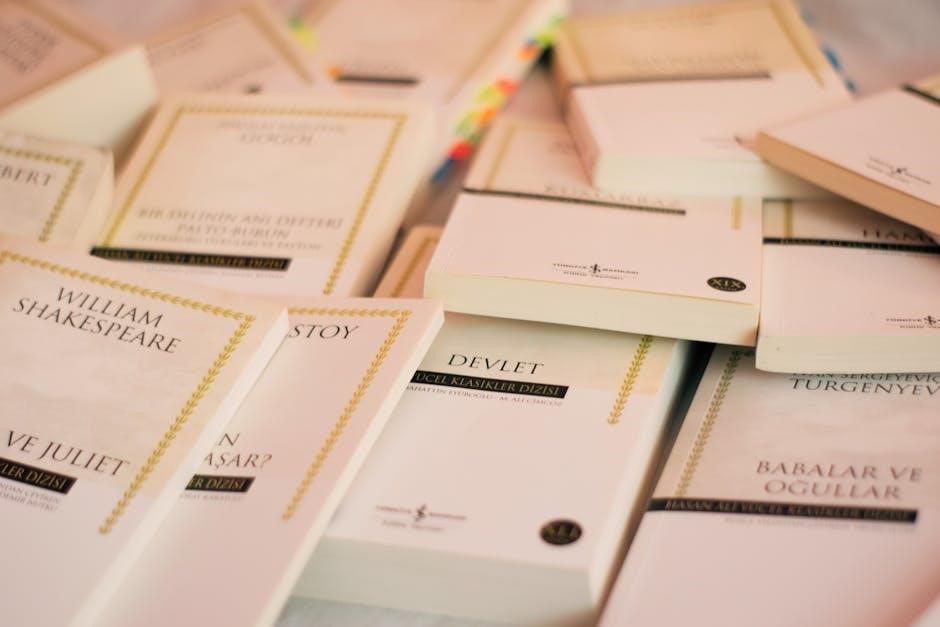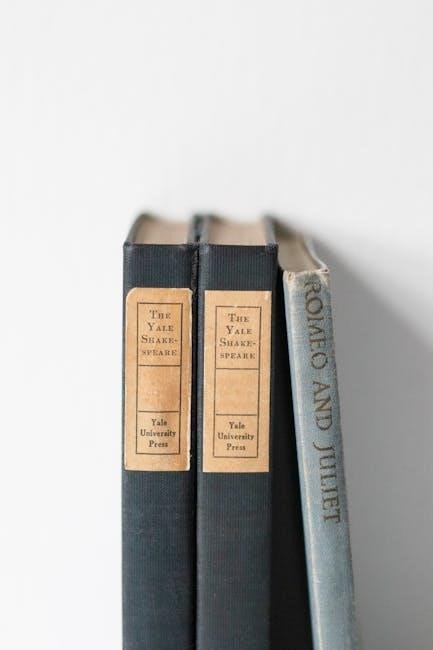Act 2 Romeo and Juliet Study Guide Article Plan
This plan explores Act 2 of Romeo and Juliet, focusing on key scenes, character development, and themes. It provides a detailed analysis of the balcony scene, the roles of Friar Laurence and the Nurse, and the escalating conflict between the families.
-
Romeo and Juliet’s Balcony Scene (Act 2, Scene 2)
-
The Role of Friar Laurence in Act 2
-
The Role of the Nurse in Act 2
-
Key Themes in Act 2
-
The Capulet’s Garden and Orchard Wall
-
The Secret Marriage and Its Implications
-
The Ending of Act 2 and Transition to Act 3
This guide offers insights into the emotional depth, dramatic tension, and tragic foreshadowing in Act 2, preparing readers for the play’s devastating conclusion.
Act 2 of Romeo and Juliet deepens the romantic bond between the protagonists while introducing familial tensions. The prologue highlights love’s transformative power, setting the stage for tragic events.
1.1 The Prologue of Act 2
The Chorus delivers a sonnet emphasizing Romeo and Juliet’s newfound love, replacing Mercutio’s humor with heartfelt emotion. It sets a tone of hope and impending conflict, hinting at fate’s role in their journey. This poetic introduction foreshadows the challenges ahead, preparing the audience for the emotional depth of Act 2.
1.2 Setting the Tone for Love and Conflict
Act 2 transitions from humor to emotional depth, emphasizing love’s intensity and conflict’s inevitability. The Chorus’s poetic introduction highlights Romeo and Juliet’s bond, while the Capulet’s garden and balcony scene symbolize love’s beauty. Yet, the families’ feud looms, creating tension. This duality of love and conflict sets a bittersweet tone, foreshadowing the tragic events ahead and deepening the audience’s emotional investment.

Romeo and Juliet’s Balcony Scene (Act 2, Scene 2)
Highlighting Juliet’s emotional soliloquy and Romeo’s bold declaration, the balcony scene captures the essence of their forbidden love in the moonlit garden, setting the stage for tragic events.

2.1 Juliet’s Soliloquy and Inner Conflict
Juliet’s soliloquy reveals her deep emotional struggle, torn between love for Romeo and loyalty to her family. She laments Romeo’s identity as a Montague, wishing he could shed his name. Her words, “What’s in a name? That which we call a rose by any other name would smell as sweet,” highlight her belief that true love transcends family feuds. This moment showcases her inner turmoil and foreshadows the tragic consequences of their forbidden love.
2.2 Romeo’s Declaration of Love
Romeo’s declaration of love is a pivotal moment, showcasing his passion and devotion. He risks danger by entering the Capulet garden, where he overhears Juliet’s soliloquy. Romeo reveals himself, professing his love with poetic fervor, comparing Juliet to the sun. His words are sincere and heartfelt, demonstrating his willingness to overcome obstacles for their union. This bold gesture underscores his romantic determination and sets the stage for their secret marriage.
2.3 The Lovers’ Vow to Be Together
Romeo and Juliet’s vow to be together is a heartfelt promise of eternal love. Despite the families’ feud, they pledge loyalty and commitment. Romeo proposes marriage, and Juliet agrees, trusting their love will conquer all. Their vows highlight the intensity of their emotions and their determination to unite, even in secret. This moment underscores their belief in love’s transformative power, setting the stage for their secret marriage and the ensuing drama.

The Role of Friar Laurence in Act 2
Friar Laurence devises a plan to unite Romeo and Juliet through a secret marriage, believing their love can end the families’ feud. His motivations are rooted in hope and faith in love’s redemptive power, as he officiates the ceremony, offering guidance and support to the star-crossed lovers.
3.1 Friar Laurence’s Plan to Unite the Lovers
Friar Laurence devises a secret plan to marry Romeo and Juliet, hoping their union will end the feud between their families. He believes love’s power can bring peace. Using his knowledge of herbs and medicine, he creates a potion to make Juliet appear dead, allowing her to escape her arranged marriage and reunite with Romeo. This risky scheme reflects his faith in love’s transformative power.
- He officiates the secret marriage ceremony.
- He provides guidance and support to the lovers.
- His plan aims to end the families’ hatred through love.
3.2 The Secret Marriage Ceremony
The secret marriage ceremony takes place in Friar Laurence’s cell, with only Romeo, Juliet, and the Friar present. The vows are heartfelt and sincere, symbolizing their commitment to one another. Friar Laurence officiates the union, believing it will end the families’ feud. The ceremony is brief yet profound, marking a pivotal moment in their tragic love story.
- Romeo and Juliet exchange vows in private.
- Friar Laurence officiates, hopeful for peace.
- The union signifies their deep commitment.
3.3 Friar Laurence’s Motivations and Beliefs
Friar Laurence believes in the power of love to end the feud between the Montagues and Capulets. He sees Romeo and Juliet’s union as a divine opportunity for peace. Motivated by hope and faith, he officiates the secret marriage, trusting in God’s plan. His actions reflect his belief in love’s redemptive power and his desire to serve as a mediator for harmony.
- Friar Laurence hopes to end the families’ feud.
- He believes love can bring peace and unity.
- His faith guides his decision to help the lovers.

The Role of the Nurse in Act 2
The Nurse plays a crucial role in Act 2, acting as Juliet’s confidante and mediator. She provides emotional support and facilitates secret communication between Juliet and Romeo.
- She is deeply loyal to Juliet and her family.
- She acts as a messenger, connecting the lovers.
- Her emotional conflict arises from her love for Juliet and the secrecy of their plan.
4.1 The Nurse’s Loyalty and Support for Juliet
The Nurse demonstrates unwavering loyalty to Juliet, serving as both a confidante and a maternal figure. She has cared for Juliet since childhood, creating a deep bond. Her support for Juliet’s romantic decisions underscores her devotion, even as she navigates the complexities of the Montague-Capulet feud. The Nurse’s emotional investment in Juliet’s happiness highlights her compassionate and protective nature, making her a vital figure in Juliet’s journey.
- Her loyalty is rooted in years of service and affection for Juliet.
- She actively supports Juliet’s relationship with Romeo, despite the risks.
- Her emotional conflict arises from her love for Juliet and the secrecy surrounding their plan.
4.2 The Nurse’s Role as a Messenger
The Nurse acts as a crucial messenger between Romeo and Juliet, facilitating their secret communication. Her role bridges the gap between the lovers, enabling their plans to unfold. Despite her loyal intentions, her actions inadvertently contribute to the play’s tragic progression. The Nurse’s reliability as a go-between highlights her significance in the plot’s development and her deep commitment to the young lovers.
- She conveys messages between Romeo and Juliet, ensuring their connection remains strong.
- Her role as a mediator showcases her trustworthiness and dedication.
- Her actions, though well-meaning, add to the play’s dramatic tension and ultimate tragedy.
4.3 The Nurse’s Emotional Conflict
The Nurse experiences deep emotional turmoil as she navigates her loyalty to Juliet and the secrecy of the lovers’ relationship. Her affection for Juliet conflicts with the burden of hiding the truth, causing internal pain. Despite her hesitation, she remains committed to the young lovers, showcasing her complex emotional state and the moral dilemmas she faces.
- Her loyalty to Juliet creates a deep emotional bond.
- The secrecy of the relationship burdens her conscience.
- Her emotional conflict highlights the play’s tragic undertones.

Key Themes in Act 2
Act 2 delves into themes of love, fate, loyalty, and conflict, showcasing Romeo and Juliet’s passionate union amidst familial hatred, foreshadowing tragic consequences.
5.1 Love vs. Hate
In Act 2, love and hate are starkly contrasted through Romeo and Juliet’s passionate bond and the families’ enduring feud. Their love grows intensely, defying societal hatred, while the families’ animosity intensifies, creating a tragic backdrop for their union.
5.2 Fate and Destiny
Fate and destiny loom over Act 2, as Romeo and Juliet believe their love is predetermined. The Chorus emphasizes fate’s role, hinting at a tragic outcome. Romeo’s impulsive decisions and Juliet’s defiance of her family suggest a belief in destiny. Their secret marriage, orchestrated by Friar Laurence, accelerates the inevitable, highlighting the inescapable forces driving them toward their doomed future.
5.3 Loyalty and Betrayal
Loyalty and betrayal intertwine in Act 2, as characters navigate conflicting allegiances. Juliet’s loyalty to Romeo surpasses her duty to her family, while Romeo risks betraying his family’s name for love. The Nurse, though loyal to Juliet, acts as a messenger, blurring the line between devotion and deception. Friar Laurence’s plan to unite the lovers tests his loyalty to both families, highlighting the tension between personal loyalty and societal expectations.

The Capulet’s Garden and Orchard Wall
The Capulet’s garden and orchard wall symbolize the barrier between the lovers. Romeo’s bold entrance over the wall highlights his determination to unite with Juliet despite the families’ feud.
6.1 The Significance of the Setting
The Capulet’s garden and orchard wall serve as a symbolic backdrop for Romeo and Juliet’s illicit meeting. The garden represents a private, romantic space where the lovers can express their true feelings, away from societal conflicts. The wall, however, embodies the physical and emotional barriers separating the two families, highlighting the forbidden nature of their love and the risks they undertake to be together.
6.2 Romeo’s Bold Entrance
Romeo’s daring entrance into the Capulet’s garden showcases his passion and determination to be with Juliet. Scaling the orchard wall, he risks discovery and danger, demonstrating the depth of his love. His boldness highlights the impulsive nature of his character, driven by emotion rather than caution. This act symbolizes his willingness to defy societal barriers for love, setting the stage for the tragic events that unfold.
6.3 The Symbolism of the Wall
The wall separating the Capulet’s garden symbolizes the divide between the two feuding families and the obstacles Romeo and Juliet face. It represents societal barriers and familial hatred, emphasizing the conflict’s depth. Romeo’s climb over the wall signifies his determination to transcend these divisions, highlighting love’s power against adversity. The wall also serves as a threshold, marking Romeo’s bold entry into a forbidden yet passionate realm.

The Secret Marriage and Its Implications
The secret marriage of Romeo and Juliet, orchestrated by Friar Laurence, deepens their commitment but intensifies familial conflict, setting the stage for tragic consequences and heartbreak.
7.1 The Decision to Marry in Secret
Romeo and Juliet decide to marry in secret to escape their families’ hatred, with Friar Laurence officiating the union. Driven by intense love and a desire for peace, they risk societal norms and familial loyalty. Their impulsive decision highlights the conflict between love and hate, hope and reality, setting the stage for tragic consequences. Juliet’s inner turmoil reflects her struggle between loyalty to her family and devotion to Romeo.
7.2 The Consequences of Their Union
Their secret marriage intensifies the feud between their families, escalating tensions and leading to tragic consequences. Romeo and Juliet’s union defies societal norms and familial expectations, creating a volatile situation. The clandestine nature of their marriage isolates them, pushing them toward a doomed fate. Their love, though pure, ignites a chain reaction of events that ultimately seals their destiny and deepens the conflict between the Montagues and Capulets.
7.3 The Role of Secrecy in the Play
Secrecy in Act 2 heightens the dramatic tension and accelerates the tragic plot. Romeo and Juliet’s hidden marriage creates a sense of urgency and isolation, as they must conceal their love from their feuding families. This secrecy forces them to rely on others, like Friar Laurence and the Nurse, whose involvement deepens the complexity. The concealment of their union ultimately contributes to the inevitability of the tragic outcome.

The Ending of Act 2 and Transition to Act 3
Act 2 concludes with Romeo and Juliet’s secret marriage, filled with hope; Tension rises as family conflicts escalate, foreshadowing the tragic events of Act 3.
8.1 The Lovers’ Hope for a Future Together
Romeo and Juliet’s secret marriage fills them with hope for a future together. They envision a life free from family hatred, believing their love can overcome all obstacles. Friar Laurence’s blessing reinforces their optimism, as they trust in his plan to unite them publicly. However, the societal barriers and looming conflicts threaten their dream, casting a shadow over their joyful union and hinting at the challenges ahead.
8.2 The Increasing Tension Between Families
The feud between the Montagues and Capulets intensifies in Act 2, as the families’ animosity toward each other deepens. The Capulets’ anger over Romeo’s presence at their party lingers, while the Montagues remain hostile. Unaware of the secret marriage, both families continue to nurture their hatred, fueling a volatile atmosphere. This escalating tension sets the stage for further conflict, even as Romeo and Juliet cling to their hope for a peaceful future together.
8.3 The Foreshadowing of Tragedy
Act 2 subtly foreshadows the inevitable tragedy through tension and ominous language. Romeo’s impulsive nature and the families’ hatred create a sense of impending doom. Juliet’s fear of being trapped in a loveless marriage and Romeo’s willingness to risk death to be with her highlight the dangerous path they are on. These elements build a sense of inevitability, hinting at the devastating outcome that awaits the star-crossed lovers.



